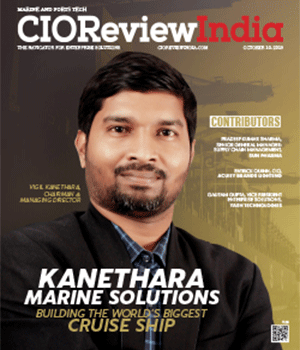Blockchain Beyond Cryptocurrencies
By Nicolas Kozakiewicz, Head of R&D, Worldline Global | Wednesday, 25 July 2018, 07:00 IST
 The blockchain is a much-used, less understood, new age word we have all heard at least once in the past few months. In fact, there has been a lot of hype about Blockchain over the past few years but how much is actually understood about the distributed platform? Most conversations surrounding Blockchain so far have centered on Bitcoin, cryptocurrencies and financial services. While these are the most commonly known applications, Blockchain is capable of a lot more and can be applied to a huge number of different industries, such as music and energy.
The blockchain is a much-used, less understood, new age word we have all heard at least once in the past few months. In fact, there has been a lot of hype about Blockchain over the past few years but how much is actually understood about the distributed platform? Most conversations surrounding Blockchain so far have centered on Bitcoin, cryptocurrencies and financial services. While these are the most commonly known applications, Blockchain is capable of a lot more and can be applied to a huge number of different industries, such as music and energy.
What is Blockchain?
As a communication protocol, Blockchain essentially provides a decentralized governance enabling peers who share the same goal to trace and log events or data, without the need for the individuals involved to know and trust each other. Unlike centralized governance, it does not need a trusted third party and is by design, secured and scalable. Peers are anonymously authenticated and access to data can be easily tailored. The blockchain is also very versatile as it can be interfaced with any information system since it is a standalone protocol that can be implemented via simple APIs.Beyond the application of Blockchain for cryptocurrencies, the protocol is currently being used for several different applications around the world. For example, in Sweden, Blockchain is being implemented in the real estate industry to register and record land titles in a bid to digitize processes. The NASDAQ is also using Blockchain for its own assets, transactions, and internal management system.
Deploying Blockchain in the industry
Worldline has created a Blockchain-focused workforce to educate colleagues, customers, and partners on the technology as well as work on several projects across different industries to explore the key usages of Blockchain. Such solutions have been implemented for organisations such as the Car Maintenance Book andSmart Corporate Bonds. The goal of Smart Corporate Bonds(SCB) was to get a better understanding of the Blockchain technology and to demonstrate its potential both internally and to customers. Corporate bonds are financial instruments issued by corporations in order to raise financing. Their processing workflows are complex and involve many decentralized actors for issuance, broker-age, coupon and maturity management, etc. This business model fits the Blockchain methodology well which is why we used it to illustrate how this technology could be used to simplify and automate these workflows. First, the Bitcoin Blockchain technology is used to record the assets (bonds) and their holders (individuals, corporations), as custodians do it today. Blockchain basically provides a “timestamped” registration of the transactions. The multiple databases and reconciliation processes used today are removed. Second, Blockchainenables the automation of transactions using the multi signature feature, a part of the Blockchain protocol. For example, a buy/sell transaction will be recorded in the blockchain when and only when the seller’s bank has received the funds from the buyer. It then signs the transaction in the Blockchain, which records the transfer of ownership. Money transfers can be done using SEPA Credit Transfer, just like in “the real world”. The Blockchainexploration tools could also be used to list the corporate-bond owners at the time of coupon or maturity payments. The transactions are initiated by buyers and sellers using an adapted Bitcoin wallet that can be downloaded from the corporate bond issuer’s website. KYC, bank account information, security etc. are integrated in this wallet solution.
“Blockchain holds much promise for industry verticals as farreaching as energy, insurance, media, politics, and transport; and it could be the ideal tool to overcome problems associated with centralized databases that can be easily hacked”
The use of Blockchain is being explored in verticals such as healthcare, logistics, payments, and e-Identification. Using Blockchain technology in the healthcare industry would allow for traceable and regulated access to patient data hosted on a secured cloud, independent blockchain. Defining which data could be accessed by which healthcare party would take place in Blockchain and access would be granted by combining the patient’s key and the unique key is given to each third party, such as a pharmacy, doctor or hospital.
Blockchain holds much promise for industry verticals as far-reaching as energy, insurance, media, politics, and transport; and it could be the ideal tool to overcome problems associated with centralized databases that can be easily hacked. Given its disruptive nature, industries, companies, and governments will need to adapt to this new approach; but Blockchain is also highly secure and scalable, making it a viable technology for the long-term. The blockchain is a topic that Atos follows closely, and this year’s international student competition that is dedicated to technical innovation – the IT Challenge – is centered on how Blockchain can be used to disrupt conventional business models.
CIO Viewpoint
Relying On Technologies To Transform Data Into...
By Mark Ohlund, CIO & Sr. V.P, Armada Supply Chain Solutions
Data Mining, Classification, And Clustering:...
By Pankaj Dikshit, SVP (IT) at Goods and Services Tax Network
Logistics Next With New Digital Age Technologies
By Sandeep Kulkarni, Head – IT at Panasonic India Pvt Ltd
CXO Insights
Changing The Status QUO - How Data And...
By Steven Little BSc. (Hons) FRICS MIAM, Director – Surveying and Asset Management, WYG Group
Next-Generation Data Warehouses
By Gautam Gupta, Vice President Enterprise Solutions, Yash Technologies
Supply Chain & Manufacturing: A Prescription...








